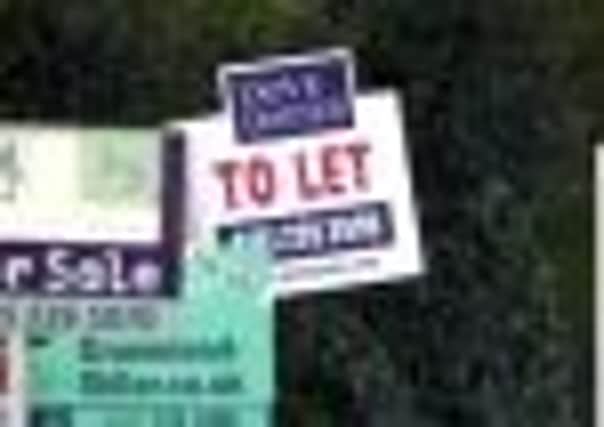Rising house rents spark fears of price bubble


Rising demand has pushed rental prices north of the Border to record highs in recently. Figures out this week show further rises as the slow housing market forces more people to rent and keeps existing tenants in their homes for longer.
The average cost of a two-bedroom flat in Edinburgh jumped by 3.4 per cent to £822 a month in the final quarter of 2012, while the same accommodation in Glasgow now costs £766 a month, according to the latest rental tracker from DJ Alexander. The report tallies with the most recent data from Citylets.
Advertisement
Hide AdAdvertisement
Hide AdRenters in the capital now pay an average of £819 a month, an increase of 5.1 per cent over the last quarter of 2012.
Only in Aberdeen is renting more expensive, with the average tenant having to fork out £899 a month, up 6.3 per cent on three months ago.
Rents are set to climb even higher, according to Stuart Pender, chief executive of Lomond Capital. “While demand for decent, affordable rental property is increasing, the supply of suitable property falls below the level of demand,” he said.
“In the current economic climate, with banks unwilling to lend freely, making mortgage financing a struggle and the next generation of students bearing huge amounts of debt, demand will only continue to increase.”
However, the trend is fuelling fears of a price bubble similar to that in the housing market prior to the financial crisis.
David Alexander, managing director of DJ Alexander, said: “With more and more people unable to secure a mortgage because of lenders’ demands for high deposits, and turning to renting as a result, the last thing we want is for rents to become unaffordable.”
Yet that’s exactly what could happen unless action is taken to protect tenants from the minority of landlords pushing rents up to unsustainable levels.
“Responsible landlords – which the vast majority are – accept that a rental bubble, tempting as this might be in the short term, is not in their longer term interests. Almost inevitably this would be followed by a rental slump, as happened in the owner-occupier market and from which it will take perhaps a decade to recover,” said Alexander.
Advertisement
Hide AdAdvertisement
Hide AdHe pointed to recent reports of letting agents south of the Border seeking to inflate rental prices by making tenants bid against each other.
Alexander asked: “Have we learned nothing from the last housing bubble? Was it really so long ago that people were in such a frenzy to get a foot on the owner-occupier ladder that they offered much more than they could afford?”
The extent of that house price boom is underlined by research out today showing that even after the recent downturn, prices in Scottish cities are up to 94 per cent higher than a decade ago.
Cities north of the Border have seen some of the biggest price rises in the UK in the decade to the end of 2012, according to a Bank of Scotland report today.
Prices in Aberdeen and Inverness are 94 and 81 per cent respectively higher than they were in 2002. Dundee (73 per cent higher) and Perth (70 per cent) are also among the UK top five. Perhaps surprisingly, however, house price increases in Edinburgh, Glasgow and Stirling have lagged the average for Scotland as a whole over the past decade.